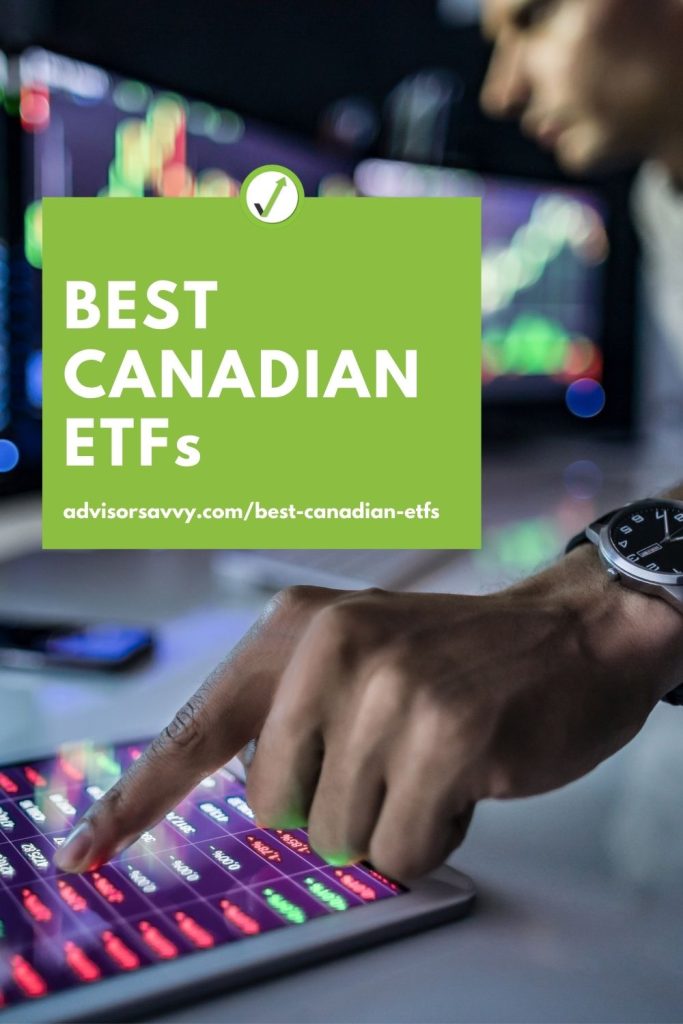
When deciding which investment tool makes the most sense for you, it’s important to understand all the available options. For starters, learning the difference between an ETF and a mutual fund means you can make the best decision today, and into the future. To help you explore what’s out there, let’s look at the best Canadian ETFs for this year.

Where to invest your money can change any given year. And amid precarious markets, these changes can happen on a dime. That being said, there are some fairly reliable places where you can invest your money that should give you returns and security. ETFs (Exchange-Traded Funds) is one of the more reliable investment tools out there.
Table of contents
- What is an Exchange-Traded Fund (ETF)?
- What are the best Canadian ETFs?
- What is the S&P 500?
- Best Canadian ETFs: Specific Market Segments
- How to buy Canadian ETFs
- Are Canadian ETFs legalized as corporations?
- Are Canadian ETFs PFICs?
- What does it mean when an ETF is Canadian hedged?
- Can Canadians buy U.S. ETFs?
If you decide to invest in an ETF, you need to determine which one is best for you, your portfolio, and your financial goals. Remember: ETFs are not all the same. The best dividend ETF might not be the best option for you, and even the best Canadian ETFs we list below might not work out just right for you.

Match to your perfect advisor now.
Getting started is easy, fast and free.
What is an Exchange-Traded Fund (ETF)?
ETFs are similar to stocks. However, instead of investing in a particular company, an ETF is essentially a basket of securities that trade together on the stock market. An ETF contains a mix of different types of investments, including bonds and commodities.
ETFs compose of established companies spread out across various market sections — a key benefit of ETFs. This baked-in diversification insulates you from market fluctuations. The nature of ETFs makes them a good tool for investors who want to get into the market. And while they are similar to mutual funds, you can buy them at a fraction of the cost. This is appealing to newer or more low-key investors. That said, there’s likely an ETF out there for just about every level of investment expertise!
There are over 1,000 ETFs available to Canadian investors. It is challenging to wade through all of them, and to know where to invest your hard-earned money. That’s why both research and talking to a professional can help guide you toward ETFs that make the most sense for you and your financial goals. Ultimately, it comes down to three key points: your risk tolerance, your investment objectives, and your overall financial picture.
Related Reading: Best Renewable Energy Stocks: Top 5 for 2023
Why invest in ETFs
ETFs are a great option for investors who can’t (or don’t want to) invest in mutual funds. They provide diversification in your investment portfolio, without the expense of a mutual fund. For a well-rounded portfolio, ETFs offer a great solution for those investing via products like Tax-Free Savings Accounts (TFSA). All in all, it’s a lower risk, more reliable approach for the more fiscally cautious investor.
ETF screener
Have an ETF in mind? The best way to decide if it’s a good investment, and to get an overall view of its performance, is to use an ETF screener. This tool helps you compare and review the current and average performance of different ETFs. You can filter and narrow down your options based on the criteria of interest.
ETFs vs mutual funds
While there is a growing move towards ETF investment in Canada, the reality remains that investors still commonly choose actively managed mutual funds. That being said, the rate of investment in ETFs continues to shift as Canadians show an increasing preference for lower-cost, passively-managed funds. In fact, a National Bank of Canada study found that the amount of money flowing into Canadian ETFs shot up by 49% in 2020, to a record $41 billion.
As mentioned above, when deciding on where to invest your money, it’s important to keep your risk tolerance, investment objectives, and overall financial picture in mind.
Related Reading: Financial Health Checks: Why You Should Do Them Regularly
What are the best Canadian ETFs?
Canadian financial institutions offer a wide variety of ETFs. While portfolio diversification is important, so are reliable, long-term quality gains. The following three ETFs represent some of the best opportunities for investing in ETFs in Canada.
Vanguard FTSE Canada All Cap Index ETF (VCN)
This fund offers diversification across small-, medium-, and large-cap stocks, tracking the FTSE Canada All Cap Index. It has a very low Market Expense Ratio or MER (i.e. the combined cost of fees, taxes, and expenses charged to the account) of 0.05% and Assets Under Management (AUM) at $6.03 billion (January 2024).
By including small- and medium-sized stocks, this fund is a good option for Canadians who don’t want all of their eggs in the energy and financial basket. While energy and finance are reliable investments, this fund helps investors buffer the risk of a hit to their entire investment portfolio during a significant market downturn.
Horizons S&P/TSX 60 Index ETF (HXT)
HXT is designed to replicate the performance of the S&P/TSX 60 Index (Total Return), net of expenses. As Horizons explains, this index is designed to measure the performance of the large-cap market segment of the Canadian equity market. It’s tax-efficient and features a very low 0.08% MER. The total Assets Under Management (AUM) is $3.68 billion (January 2024).
iShares Core S&P/TSX Capped Composite Index ETF (XIC)
Why XIC? As BlackRock explains on their fund page, “own the entire Canadian stock market.” (And at a low cost, to boot.)
It’s a great choice for passive investors since the goal of this ETF is to provide investors with long-term capital growth, replicating the performance of the S&P/TSX Capped Composite Index (net of expenses) — Canada’s best-known index. It also features a very low MER of just 0.06% and net assets of $10.6 billion (January 2024).
What is the S&P 500?
When reviewing ETFs, you’ll probably come across ‘S&P 500.’ This means Standard & Poor’s 500, a capitalization-weighted index of 505 large-cap U.S. stocks. The benefit of investing in the S&P 500 is that it isn’t focused on just one sector. Hello, diversification!
According to Investopedia, the 10 biggest stocks make up 28.5% of this index’s market value. It also accounts for 80% of the market value of the U.S. equities market. As of March 2022, some of the largest components of the S&P are Apple, Microsoft, Amazon, Facebook, Google — all companies you definitely picture when thinking of large-cap stocks!
There aren’t many ETFs focusing exclusively on the S&P 500 as a guide. Some ETFs use it to heavily influence the composition of the portfolio. ETFs that focus on the S&P 500 are often considered to be more reliable investments because of their high placement on the index. Big, high-earning companies may feel more trustworthy to investors looking for high-quality returns.
Which S&P 500 ETF Is Best?
iShares Core S&P 500 ETF (IVV) is well-rounded and closely follows the S&P 500 with only slight tweaks and adjustments. Given its reliability and diversity, it’s a long-term investment portfolio. The MER is 0.03% and the total Assets Under Management are $416 billion (January 2024).
Related Reading: Best Canadian Dividend Stocks
Best Canadian ETFs: Specific Market Segments
When investing in an ETF, you can select market segments. For this reason, many people focus their investments on specific commodities or fund groups. The following list highlights some of the most popular ETF groups and the best places to consider investing your money this year.
Related Reading: Cash ETF Canada
Best Canadian Bank ETF
There are several bank ETFs to choose from in Canada. But our top picks are BMO Covered Call Canadian Banks (ZWB) and BMO Equal Weight Banks Index ETF (ZEB), both medium risk and managed by BMO Global Asset Management. ZWB divides its funds equally among Canada’s top banks and is designed for investors looking for higher income from equity portfolios. Its MER is 0.71% and the AUM totals $2.94 billion (January 2024). ZEB is designed to replicate (as much as possible) the performance of the Solactive Equal Weight Canada Banks Index (net of expenses) and is for investors looking for growth solutions. Its MER is 0.28% and the AUM totals $3.61 billion (January 2024).
FYI: the ‘covered call’ option means that a buyer can purchase the shares from the ETF in which it is currently invested. This provides an additional opportunity for investors to benefit from the ETF.
What is a bank ETF?
A bank ETF is a group of stocks that focus specifically on the banking and financial sector. Banking is one of the primary economic drivers in Canada. Given the profitability of this industry, it is a wise investment. Bank ETFs tend to provide significant yields and dividend payouts, making them attractive to investors.
Related Reading: Banking vs Financial Services: What’s the difference?
Best Canadian Gold ETFs
Gold is, overall, a good investment — a way to diversify your portfolio and keep it hedged against market downturns. Essentially, it’s a defensive investment. It should, however, be carefully limited in your portfolio, given that it can be quite volatile. It doesn’t have utility, and its value is purely tied to speculation.
While it does have a “high” risk rating, iShares S&P/TSX Global Gold Index ETF (XGD) is geographically diverse. Its objective “seeks to provide long-term capital growth by replicating the performance of the S&P/TSX Global Gold Index, net of expenses.” As of January 2024, this fund has 41 holdings, net assets of $1.04 billion, and a MER of 0.61%.
If you want your portfolio to invest directly in physical gold, then the iShares Gold Bullion ETF (CGL) is also a solid investment. Per Blackrock, this ETF’s objective is to replicate the performance of the price of gold bullion, fewer fees and expenses, in a cost-effective way. With an MER of just 0.55% and net assets of $208 million, this ETF comes with medium-high risk (January 2024).
Related Reading: Best Gold ETFs in Canada for 2024
Best Canadian Bond ETFs
Bond ETFs invest in fixed-income securities like corporate bonds or treasuries. With low costs and deep liquidity, these ETFs help your portfolio earn income from interest payments. They can be part of a well-balanced portfolio.
Two ETFs are at the top of the list: BMO Aggregate Bond Index ETF (ZAG) and Vanguard Canadian Aggregate Bond Index ETF (VAB). Both funds are designed to provide consistent, moderate income. ZAG is designed to replicate, as close as possible, the performance of the FTSE Canada Universe Bond Index, net of expenses. VAB seeks to do the same, but with the Bloomberg Global Aggregate Canadian Float Adjusted Bond Index. Both funds have a MER of 0.09% (January 2024).
Best Renewable and Green Energy Stocks in Canada
Renewable and green energy has been picking up steam in recent years, as more jurisdictions realize the need to turn to clean energy. Both individuals and companies now consider ESG — or Environmental, Social, and Governance — principles in their investment choices. Simply put, investors want to align their money with their values.
Our top two picks are Algonquin Power & Utilities (AQN) and Brookfield Renewable Energy Partners (BEP.UN).
The former is a pretty safe bet, given that utilities offer reliable passive income. As Motley Fool explains, the combo of long-term contracts and regulated assets mean steady cash flow. It currently trades for $7.90 CAD per share, with a 7.27% dividend yield (January 2024).
Brookfield — a global renewable energy industry leader — has a dividend yield of 5.26% (January 2024). Its portfolio is diverse, with projects around the world. Given their leadership in the fast-moving, fast-growing space, this stock could be a great investment.
Related Reading: How to Invest in Index Funds in Canada
How to buy Canadian ETFs
Ready to invest in ETFs? Great! Now it’s time to pick your fund and start investing.
There are a few options. For one, go right to the source. For large ETF providers, like Vanguard, you can buy into the fund directly at no additional cost. Alternatively, you can use an online trading platform. Or, if this is the early days of your investment journey, we recommend consulting a professional investment advisor to help guide you with their expertise and experience.
Are Canadian ETFs legalized as corporations?
ETFs in Canada are typically structured as a trust or a corporation. Because of this, they operate separately from the management company that runs them. ETF investors, therefore, get shares or units of the fund.
Are Canadian ETFs PFICs?
A Passive Foreign Investment Company (PFIC) is a foreign-based corporation with gross income that is largely based on passive income, such as interest. In addition, half of the assets of a PFIC are investments that produce income based on earned interest, dividends, or capital gains. In Canada, all mutual fund trusts, including ETFs, are PFICs.
What does it mean when an ETF is Canadian hedged?
Hedged funds are those sold in Canada but hold U.S. stock. Simply put, an ETF that is Canadian hedged (eg. iShares Core S&P 500 ETF) means it protects against market fluctuations in the U.S. Its Canadian-dollar value goes up and down only with the movements of the stocks in the portfolio.
For example, say you invest in the S&P, and the market drops by 5%. That means your investment also drops. But that drop is not as significant because it’s hedged in Canadian dollars, not U.S. currency. In a nutshell, the exchange rate differential over time does not impact a Canadian hedged ETF in the same way an unhedged fund would.
Can Canadians buy U.S. ETFs?
You can but at a cost. Canadian investors pay a withholding tax of 15% on U.S. ETF dividends. You pay this tax to the American government before seeing the remainder of your dividends. So go ahead and invest, but unless it is a high-yielding investment, it might not be worth the hit you take before you even see a penny.
Read More: 5 Best Money Market ETFs in Canada

